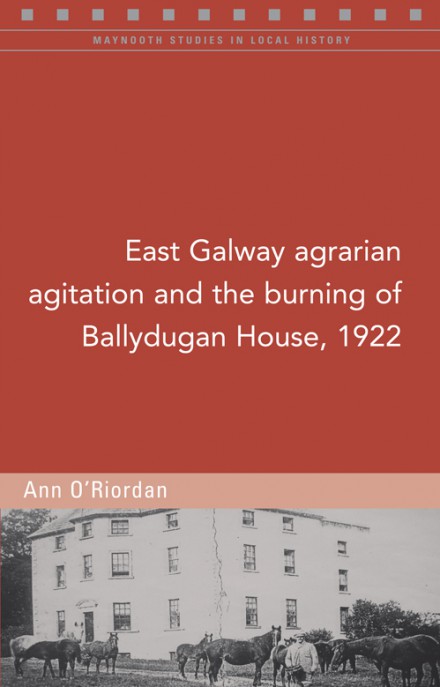East Galway agrarian agitation and the burning of Ballydugan House, 1922
Ann O'Riordan
‘[O’Riordan’s] work demonstrates the value of local studies in attempts to understand the events of this period. It is a fascinating story of a family and their relationship with the surrounding area’, Fionnuala Walsh, Family & Community History (October 2016).
‘Anne O’Riordan’s interesting book shows the varied interests of the Burke family with Michael’s (landlord and owner of Ballydugan House) younger brother, Bobby, becoming a well-known Christian socialist who was involved in the campaign to eradicate tuberculosis, while Michael achieved notoriety as a headstrong, provocative and difficult man … O’Riordan has appropriately gone beyond the immediate and looked at the long-term consequences of the burning of the Big House’, Brian Casey, Irish Literary Supplement (Spring 2017).
‘The Maynooth Studies in Local History are one of the most significant publishing achievements in Irish History in the past quarter century … they are a triumphant demonstration of the value of the local approach [and] are illustrative, individually and severally, of the exemplary potential of the micro-study, and of the illuminative and illustrative quality of an approach that not just accommodates but provides a raison d’etre for a form of history that celebrates the diversity that underlies every generalisation that historians aspire to reach’, James Kelly, Studia Hibernica (2014).
‘The Maynooth Studies in Local History have brought about a quiet revolution in Irish local studies, and have changed the larger landscape too. Working from fascinating and little-known sources, and mobilizing the resources of energetic and imaginative scholarship, an extraordinary range of subjects has been identified, illuminated, and brought into focus. These 100 publications not only explore little-known local episodes and phenomena; they constitute a major contribution to the mainstream of Irish history’, R.F. Foster.
